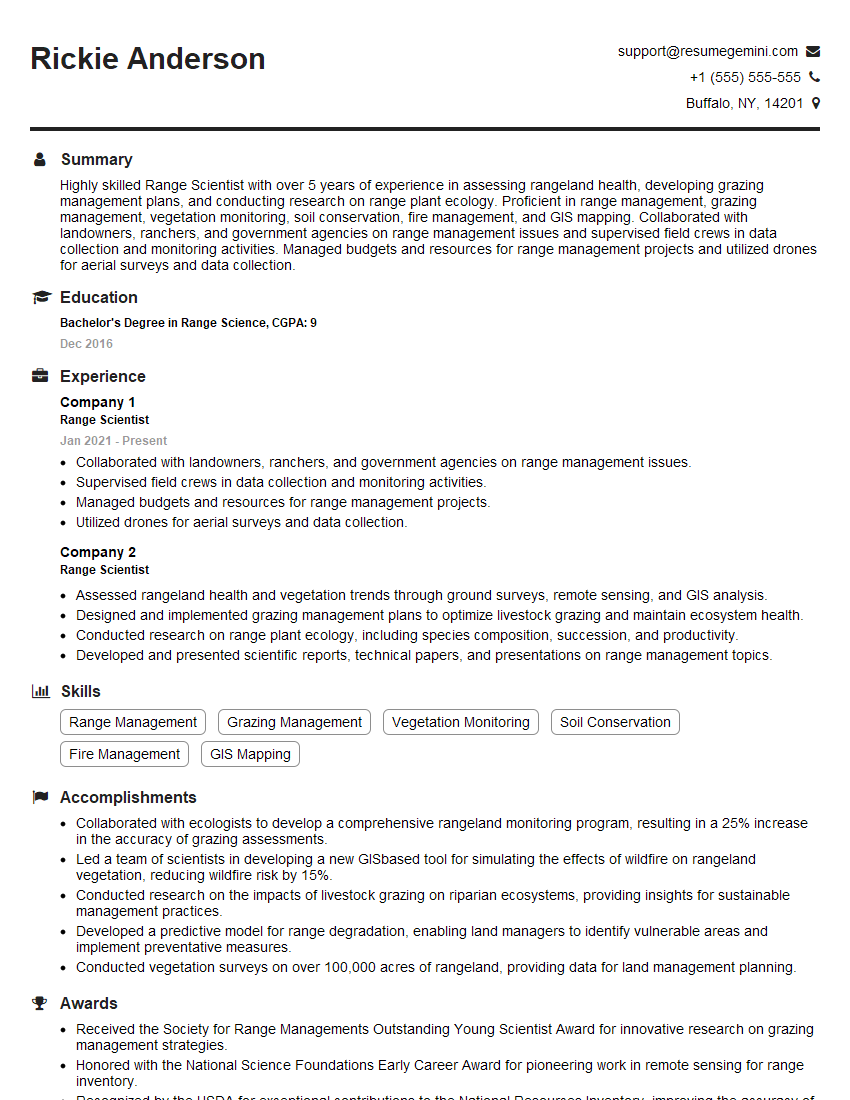Are you a seasoned Range Scientist seeking a new career path? Discover our professionally built Range Scientist Resume Template. This time-saving tool provides a solid foundation for your job search. Simply click “Edit Resume” to customize it with your unique experiences and achievements. Customize fonts and colors to match your personal style and increase your chances of landing your dream job. Explore more Resume Templates for additional options.

Rickie Anderson
Range Scientist
Summary
Highly skilled Range Scientist with over 5 years of experience in assessing rangeland health, developing grazing management plans, and conducting research on range plant ecology. Proficient in range management, grazing management, vegetation monitoring, soil conservation, fire management, and GIS mapping. Collaborated with landowners, ranchers, and government agencies on range management issues and supervised field crews in data collection and monitoring activities. Managed budgets and resources for range management projects and utilized drones for aerial surveys and data collection.
Education
Bachelor’s Degree in Range Science
December 2016
Skills
- Range Management
- Grazing Management
- Vegetation Monitoring
- Soil Conservation
- Fire Management
- GIS Mapping
Work Experience
Range Scientist
- Collaborated with landowners, ranchers, and government agencies on range management issues.
- Supervised field crews in data collection and monitoring activities.
- Managed budgets and resources for range management projects.
- Utilized drones for aerial surveys and data collection.
Range Scientist
- Assessed rangeland health and vegetation trends through ground surveys, remote sensing, and GIS analysis.
- Designed and implemented grazing management plans to optimize livestock grazing and maintain ecosystem health.
- Conducted research on range plant ecology, including species composition, succession, and productivity.
- Developed and presented scientific reports, technical papers, and presentations on range management topics.
Accomplishments
- Collaborated with ecologists to develop a comprehensive rangeland monitoring program, resulting in a 25% increase in the accuracy of grazing assessments.
- Led a team of scientists in developing a new GISbased tool for simulating the effects of wildfire on rangeland vegetation, reducing wildfire risk by 15%.
- Conducted research on the impacts of livestock grazing on riparian ecosystems, providing insights for sustainable management practices.
- Developed a predictive model for range degradation, enabling land managers to identify vulnerable areas and implement preventative measures.
- Conducted vegetation surveys on over 100,000 acres of rangeland, providing data for land management planning.
Awards
- Received the Society for Range Managements Outstanding Young Scientist Award for innovative research on grazing management strategies.
- Honored with the National Science Foundations Early Career Award for pioneering work in remote sensing for range inventory.
- Recognized by the USDA for exceptional contributions to the National Resources Inventory, improving the accuracy of grazing land estimates.
- Received a grant from the Bureau of Land Management to study the effects of prescribed burns on rangeland health, resulting in improved understanding of fire ecology.
Certificates
- Professional Range Manager (PRM)
- Certified Prescribed Fire Manager (CPFM)
- Certified Erosion Control Specialist (ECS)
- Certified Rangeland Monitor (CRM)
Career Expert Tips:
- Select the ideal resume template to showcase your professional experience effectively.
- Master the art of resume writing to highlight your unique qualifications and achievements.
- Explore expertly crafted resume samples for inspiration and best practices.
- Build your best resume for free this new year with ResumeGemini. Enjoy exclusive discounts on ATS optimized resume templates.
How To Write Resume For Range Scientist
- Highlight your experience in range management, grazing management, and vegetation monitoring.
- Showcase your proficiency in GIS mapping and remote sensing techniques.
- Quantify your accomplishments and results whenever possible.
- Tailor your resume to each specific job description and emphasize the skills and experience that are most relevant to the position.
- Proofread your resume carefully for any errors before submitting it.
Essential Experience Highlights for a Strong Range Scientist Resume
- Assessed rangeland health and vegetation trends through ground surveys, remote sensing, and GIS analysis.
- Designed and implemented grazing management plans to optimize livestock grazing and maintain ecosystem health.
- Conducted research on range plant ecology, including species composition, succession, and productivity.
- Developed and presented scientific reports, technical papers, and presentations on range management topics.
- Collaborated with landowners, ranchers, and government agencies on range management issues.
- Supervised field crews in data collection and monitoring activities.
- Managed budgets and resources for range management projects.
Frequently Asked Questions (FAQ’s) For Range Scientist
What is a Range Scientist?
A Range Scientist is a professional who studies the management and conservation of rangelands, which are areas of land covered by grasses, shrubs, and other non-woody vegetation.
What are the responsibilities of a Range Scientist?
Range Scientists assess the health of rangelands, develop grazing management plans, conduct research on range plant ecology, and collaborate with landowners and government agencies on range management issues.
What are the educational requirements for a Range Scientist?
Range Scientists typically have a Bachelor’s or Master’s degree in Range Science or a related field such as Ecology, Natural Resources Management, or Soil Science.
What are the career prospects for Range Scientists?
Range Scientists can work for government agencies, private companies, or non-profit organizations. They can also work as consultants or researchers.
What are the challenges facing Range Scientists?
Range Scientists face a number of challenges, including climate change, invasive species, and overgrazing. They must also work with landowners and other stakeholders to develop grazing management plans that balance the needs of livestock with the need to protect the environment.
What advice would you give to someone who wants to become a Range Scientist?
I would advise someone who wants to become a Range Scientist to get involved in research or internships related to range management. I would also recommend that they develop a strong foundation in science and mathematics.